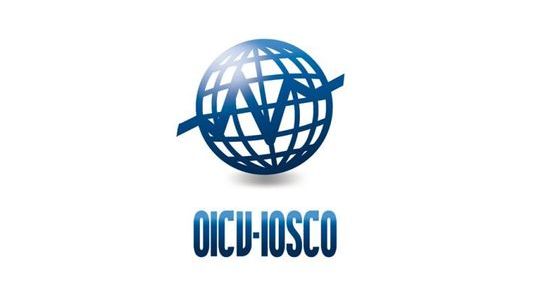Adoption, growth and challenges: Is responsible investment becoming mainstream?
Published: 28 November 2018
On 21 November, AIMA and KPMG held the second in their series of interactive roundtable discussions in London’s Mayfair. The topic under scrutiny on this occasion was hedge funds and responsible investment, providing the occasion for a discussion on the findings of the AIMA and CAIS research report ‘From Niche to Mainstream: Responsible Investment and Hedge Funds'.
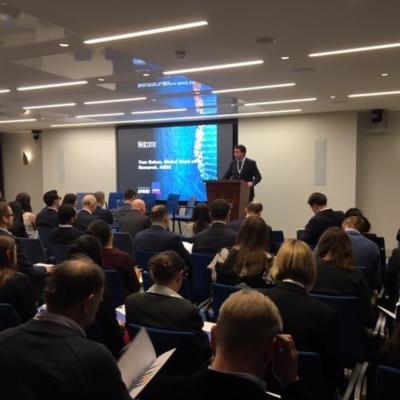
Tom Kehoe, Director, Global Head of Research at AIMA
AIMA’s Global Head of Research, Tom Kehoe, opened the event by describing how recent industry data is revealing that responsible investing (RI) is becoming increasingly common across asset management, including the alternative investment industry. Institutional investors are now concerned about reputational risks. Millennials, meanwhile, are more committed than previous generations to creating social benefit from their investments.
Tom outlined how “today’s investors expect their investments to reflect their values and account for long-term environmental risks.” Growing investor demand, an explosion of data and advances in technology are enabling and driving hedge fund firms to use environmental, social and governance factors as a lens through which to view risk. In short, the hedge fund industry is now facing serious calls to offer RI opportunities to its investors.
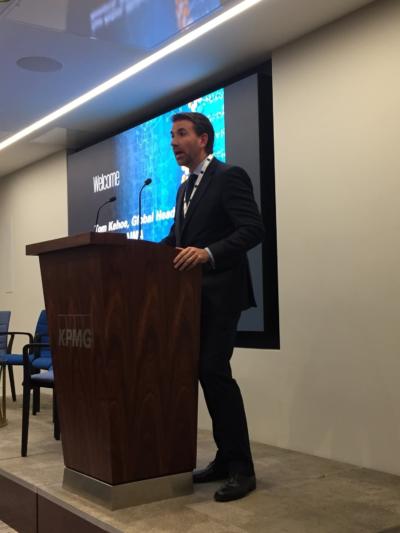
Tom Kehoe, Director, Global Head of Research at AIMA
The AIMA and CAIS research paper ‘From Niche to Mainstream: Responsible Investment and Hedge Funds’ provided essential new insight into Environmental, Sustainability and Governance (ESG) investment. Tom explained how, upon reviewing these findings, it felt like the whole world was realising that investors not only want managers to deliver returns, but to do good as well.
Discussing ‘From Niche to Mainstream’
Richard Scott-Hopkins took the audience through the findings of AIMA’s research paper, providing insights into how hedge funds are adopting RI and/or deploying ESG factors.
These included:
• Over half of all respondents to the AIMA/CAIS survey stated that investors are demanding more responsible investment practices.
• Investors surveyed think investments should reflect the morals of the investor making them, and that long-term environmental damage and socially irresponsible business practices are risk factors which the market has not ‘priced’ or acknowledged.
• Responsible investment is seen by the hedge fund industry as a long-term trend and requirement and that it is important to institutional investors, who are pushing larger hedge funds firms to embrace the phenomenon.
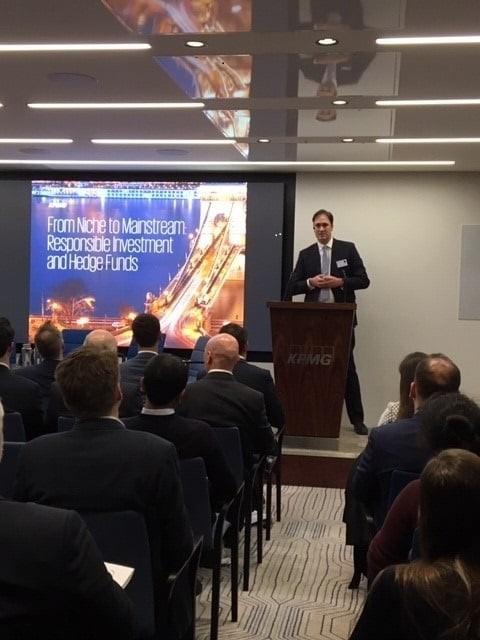
Richard Scott-Hopkins, Partner at KPMG Cayman Islands
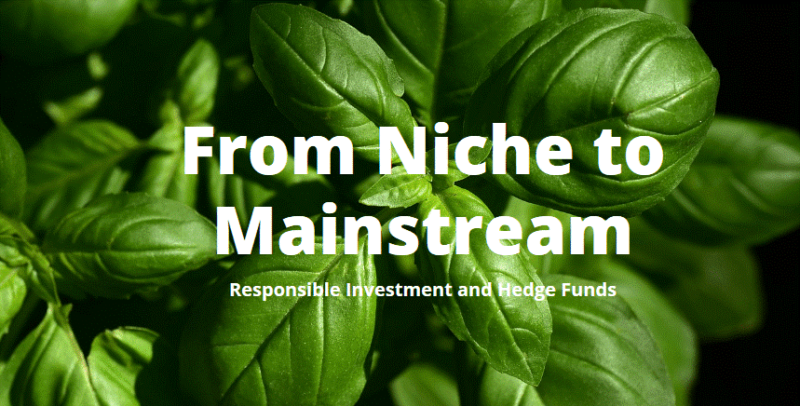
Richard highlighted the current difficulties in calculating sustainability risk, the lack of relevant disclosures from companies and the challenges to wide implementation of RI practices. As an immediate step towards increasing ESG adoption, Richard identified the six UN PRI principles as something that asset managers could sign up to and be counted on.
Engaging with ESG – the panel discussion
The panel discussion that followed the keynote presentations stimulated excellent audience participation. For the purposes of the event, the audience was split into asset managers on the right and asset owners on the left. A show of hands from attendees at the start of the panel confirmed that RI and ESG are fast becoming mainstream.
One panellist outlined how allocators previously focused on governance, but are now keen to understand how the environmental and sustainability aspects will be implemented. As more data is now available, allocators are starting to look at hedge funds in this space. In the long term, the panellist said that ESG strategies would lead to outperformance.
The asset owners asked how hedge funds address the issue of ethical tax. A panellist responded that managers have fiduciary responsibilities but that their focus is on generating alpha for their investors. Some audience members asked whether the panellists are looking to invest in technology or new hardware specifically intended to benefit the world, such as systems that improve power distribution in Africa. The panellists agreed that this was more the realm of private equity than hedge funds.
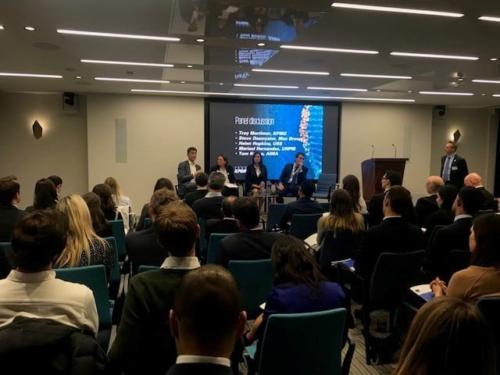
From left to right: Steve Desmyter, Co-Head of Responsible Investment at Man group; Helen Hopkins, Responsible Investment Advisor at USS; Marisol Hernandez, Senior Manager at UN PRI; Tom Kehoe, Director, Global Head of Research at AIMA
Challenges
At a general level, the audience questioned whether hedge funds were really compatible with the long-term nature of some of the demands of complying with ESG. It was said that some strategies, such as those using high-frequency trading, did not immediately appear to suit this type of investment approach.
The EU Commission’s proposal, which aimed to incentivise asset managers to incorporate ESG principles, was included as a challenge to a broader adoption of RI/ESG by the industry. A panellist noted that this measure would force through regulations on ESG rather than allow its growth to be investor-led. AIMA has argued that that growth in responsible investment should be driven by the market rather than enforced by regulation. ‘From Niche to Mainstream’ revealed that there is sufficient investor demand for ESG/RI hedge funds to grow organically.
However, the panel questioned whether investors would stick with a hedge fund that used a committed ESG strategy during periods when returns are under pressure.
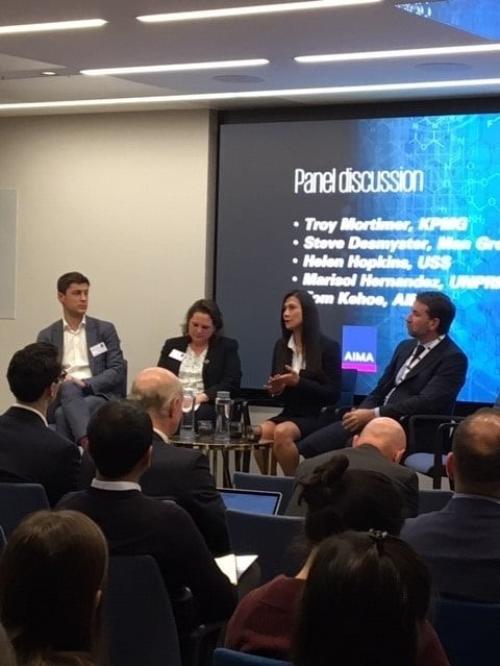
From left to right: Steve Desmyter, Co-Head of Responsible Investment at Man group; Helen Hopkins, Responsible Investment Advisor at USS; Marisol Hernandez, Senior Manager at UN PRI; Tom Kehoe, Director, Global Head of Research at AIMA.
What can hedge funds do to push ESG?
The audience asked the panel whether they, through hedge funds, could actively engage in restricting access to capital for ‘irresponsible’ investments like armaments manufacturers and tobacco companies. They said an effective way to achieve this was through shorting these stocks - the irony being that the practice of short selling, albeit a legitimate investment technique, could be seen by some as an ‘irresponsible investment’ technique. Depending on how the EU Commission’s proposals develop, short sales on companies with high ESG risks could be viewed in the same unfavourable light as long investments in those companies. The panel outlined how, in practice, a hedge fund would just exclude these companies rather than actively short them. This was due in part to the length of time these short positions might be held to realise returns. However, one panellist noted that in the past shorting has caused share prices to fall even after a ban has been implemented.
AIMA has two dedicated working groups which, respectively, (i) look to help the UN PRI produce a series of guides for hedge fund managers to help them understand how they might best prepare themselves to be RI compliant, and (ii) provide input on the sustainable investment policy debate and participate in other ESG-related projects.
Thank you
We wish to thank KPMG, the panellists and all who attended such an interactive and engaging event. At AIMA, we look forward to working with the alternative investment industry to further promote ESG and RI. The next in our series of interactive roundtable discussions with KPMG will be held next year, so please look out for announcements in our regular events newsletter.






